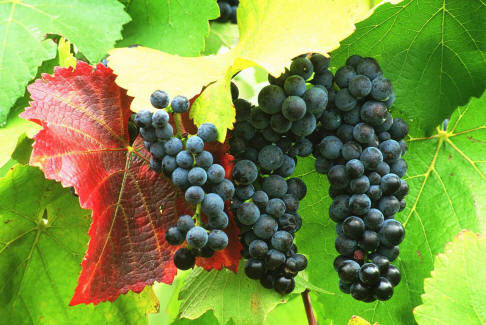This summer we drove through Mendocino County wine country in California. Thousands of rows of grape vines contoured the hillsides and valleys, resplendent with wide verdant leaves. Along the road were the wineries, their tasting rooms little oases of hospitality. We stopped at a couple to sample the products of the fields. The wines seemed the very essence of the green plants, warm sun, heavy air, and rich soil.
In today’s Gospel reading, Jesus tells the parable of a landowner who created a vineyard — how he planted it, put a fence around it, dug a wine press in it, and built a watch-tower. Having seen the California fields, I know this is a work that would have taken time. In the first year, the landowner would have planted the vines, little skinny things that looked like twigs. Once they had started growing, he would have trained them up along a trellis, pruning heavily so that only one or two shoots per plant survived. These would have become branches, and more shoots would have sprouted from them, but in this first year they would not have produced any fruit.
When the vines had become dormant at the end of that first growing season, the landowner would have drastically pruned them again. Maybe he would also have taken cuttings which he would have planted to make more vines. In the second year, new shoots would have come out of the first year’s vines and the cuttings would have rooted and grown. Again the vines would have been heavily pruned and trained. Again new sprouts and leaves would have grown, and at the end of the second growing season there would have been a modest harvest. Another extensive pruning and the vines would have been ready to winter over. By the third year the vineyard might have been ready to pass along to the tenants.
The tenants would have been experienced vintners. They would have continued to skillfully nurture the vines in all the ways necessary. They would have put all their knowledge and sweat into getting grapes harvested at just the right time, pressed in just the right way, and fermented under just the right conditions. The quality of their product would reflect their talent and expertise. I imagine their pride and their satisfaction. I imagine how they might have begun to think that the landowner didn’t deserve any of the produce from the vineyard. Since they had taken over, he had done no work at all.
Hearing Jesus’ parable, the chief priests and the Pharisees realize Jesus is talking about them. But, contemplating it, I see that the story is also about me. Though I tend to forget it often, I myself am a vineyard belonging to God. The air and soil and water of my psyche are all from God, and God created this grape growing and wine making operation that is me with focused, laborious intention. The tenants are my ego. They get it in their head that, having done all the work of being me, they ought to be able to claim the fruits of my efforts. After all, isn’t the wine I produce a testament to my skill, ingenuity and hard work? And yet, the vineyard really does belong to God.
Following this contemplation a little further, I see that I get into lots of trouble when I try to keep the produce of the winery for myself. The world is a very frightening place when I think that I’ve gotten where I am by my own efforts alone. I have to worry about what will become of me. Have I saved up enough money? Will a change in government policies ruin me? What will happen if I have a stroke or contract some very serious illness – or if my house falls down around my ears? What will become of the vineyard? My fear makes me defensive, even violent.
If I can just remember that I belong to God and that God has invested a lot in me, I can relax. I can give God the produce of my fields, knowing that they really do belong to God. God will take care of me, because I am God’s, even unto death.
That’s a big “if”, though. The illusion of being the master of my destiny is very compelling.
Fortunately God sends slaves in droves to remind me. And when that doesn’t work, God sends God’s son. Over and over again I find the son at my gates. Over and over again I have the choice to let him in or to take him out and kill him. During this Advent season, I want to be aware enough that when he comes knocking I let him in. I want to be able to say, “Welcome, Master. All that you see here is yours and I am happy to have been of service to you.”
Laurie Gudim is a writer and religious iconographer who lives in Fort Collins, CO. You can view some of her work at Everyday Mysteries.
Image: Grapes

